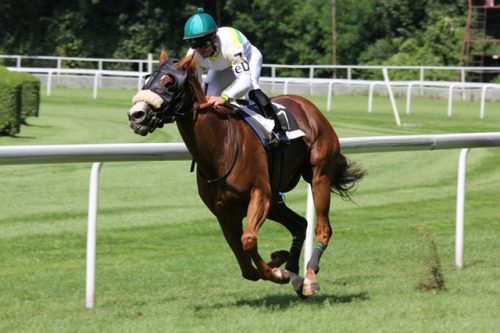The Cheltenham Festival is one of the most hotly anticipated meetings in the National Hunt racing schedule. This four day event is a chance for some of the best trainers and riders from across the UK and Ireland to stake their claim in the history books. It’s also a great opportunity for punters to enjoy a day out with the chance to win some money at the bookies. Just to put it all into numbers, it is reckoned that over £500 million is wagered in total over the festival.
With such big amounts of money involved, we bet you are wondering just how you can get your hands on some of the winnings. Well, we can’t predict the winners of the Cheltenham Festival but we can give you the low down on everything you need to know about the horse race meeting, from the most important races to the golden betting rules. So, whether you are cheering from the grandstand or betting online, you will be in the know.
A Festival of Horse Racing
The Cheltenham Festival is one of those events that you’ve probably heard about even if you’re not particularly well-versed when it comes to betting on the horses. Along with the Grand National at Aintree, the Gold Cup race at the Gloucestershire racecourse is one of the most important in the racing calendar and it is not to be missed by the punters. Some of the most famous Gold Cup winners include Best Mate and Kauto Star.
But there is much more to this carnival of horse racing than just the Gold Cup. The event takes place over four days in the middle of March – usually falling over Saint Patrick’s Day – and there is a schedule of 28 races in total. These races are varied in length and class with hurdles, steeplechases, handicaps and novice races. Let us look at each of these race types in a bit more detail:
- Hurdles: these races are usually for the younger runners, with hurdle obstacles that are often no more than three and a half feet tall. This provides a great opportunity for younger horses to get experience when it comes to jumping in a race. Then again, the biggest hurdle race at the festival is the Champion Hurdle and it has only been won once by a horse under the age of six.
- Steeplechase: these races are for more powerful and experienced horses since the obstacles – known as fences – are higher, more varied and more demanding. The Gold Cup is the main chase event at Cheltenham and it has only been won by a horse under the age of seven one time in the past 50 years.
- Handicap: as you can imagine, this type of race aims to level the playing field by ranking the horses by ability and assigning different weights to make the race fair. Handicap races are held in both the hurdles and steeplechase categories with top races such as the County Handicap Hurdle and Festival Trophy Handicap Chase.
- Novices: these races are open to runners which haven’t won the specific race type before the beginning of the season. This type of race is often more difficult to predict since there is no long range of form to suggest which horses can do well, although it may be the case that some horses have been dominating their respective races in the weeks before the festival. Some novice races include the Baring Bingham Novices’ Hurdle, Close Brother Novices’ Handicap Chase and Golden Miller Novices’ Chase.
Get to Know the Course
The horses, jockeys, trainers and owners may come and go every year but the one thing that stays (more or less) the same is the Cheltenham racecourse. The site itself is described as a “natural amphitheatre” and this lends a hand to the often electric atmosphere that is produced by the crowd. The first race of the festival is met with the famous “Cheltenham roar”, adding that extra layer of buzz and anticipation.
As for the course itself, punters need to take into consideration a number of factors. First of all, there are actually three courses in total that are used at the festival: the Old Course is used during the first two days, the New Course is used over the last two days and the Cross Country Steeplechase Course is used only once for the Glenfarclas Cross Country Chase. Mick Fitzgerald, who was the leading jockey at the festival in 1999 and 2000 stated that the Old Course was the quicker of the two main courses.
The most notable feature of the racecourse as a whole is its undulating terrain and uphill finish. This means that there is even more emphasis on backing horses with stamina in the longer races, especially those which don’t go for the finishing line too soon.
Golden Rule For Betting
There is no way to confidently say who will win the races at the Cheltenham Festival, otherwise we’d all be a lot better off that we are in the financial department. While predicting the future is the stuff of make believe, we can give you some solid advice on how to approach the week to give you be best chance of making some profit.
- Be prepared: doing your homework really pays off in any betting situation, and especially so in the Cheltenham Festival meeting. There are 30 races over 4 days, which might seem like a lot to get your head around but the more you know before you bet the more likely you are to succeed.
- Don’t be a slave to trends: horse race bettors love to reel off statistical trends, such as the fact that 9 out of 10 handicap hurdle winners between 2006 to 2010 had won on their last time out. Of course, these trends can be interesting and they should inform your decision but you should know that there are always exceptions to the rules.
- Listen to insider knowledge: one way to potentially spot when a trend is going to be broken is by listening to the right people before the races. Jockeys and trainers might be able to shed some information about how their horses are running, perhaps inadvertently giving you a tip on a potential winner with good odds.
- Shop around: you wouldn’t set up an account at the first bank you walked into and you shouldn’t do so when it comes to online bookmakers. Do a bit of research to find out which online sportsbook tends to have the best value odds for horse racing and if they are offering any Cheltenham Festival bonus offers such as a Non-Runner No Bet concession.
- Pace yourself: There’s nothing worse than going into the Gold Cup day at festival with no bankroll left. Like any form of betting, it’s a good idea to set yourself limits and realistic targets. If your wagers don’t come through on the first day then just accept that you had some rotten luck. Don’t chase the losses by placing bets you wouldn’t normally place because could lead to even more losses.
- Spread your bets: one way to ensure that you don’t squander it all away is to spread you bets across the field. The competitive nature of the races at the festival is reflected in the competitive odds available, meaning that it is incredibly feasible to bet on more than one horse in a race. It’s important to keep within your budget, but spreading your bets with an aim to maximise profit potential can be done with each-way bets and combination bets.
Enjoy The Ride
There is no getting away from the fact that there is money to be made by betting at the Cheltenham Festival. Whether you are one of the lucky ones who ends up with more money in their pocket or one of the unlucky ones who makes a loss, the most important thing is to embrace the atmosphere and enjoy the ride! And before placing a bet, head to our Best Online Bookmakers page to get the latest odds, free bets and advice.














